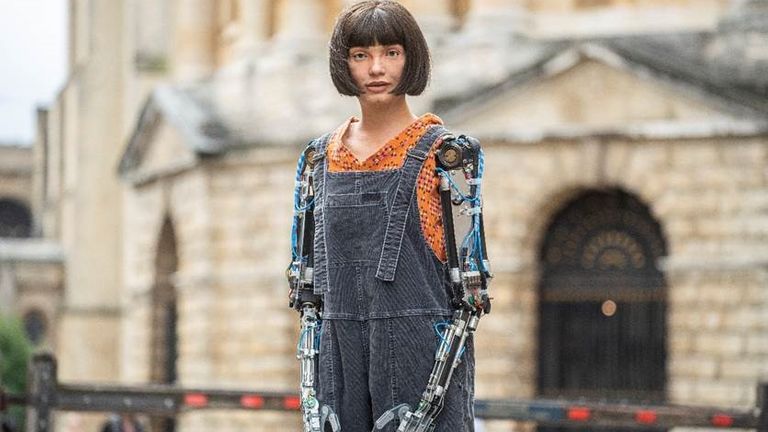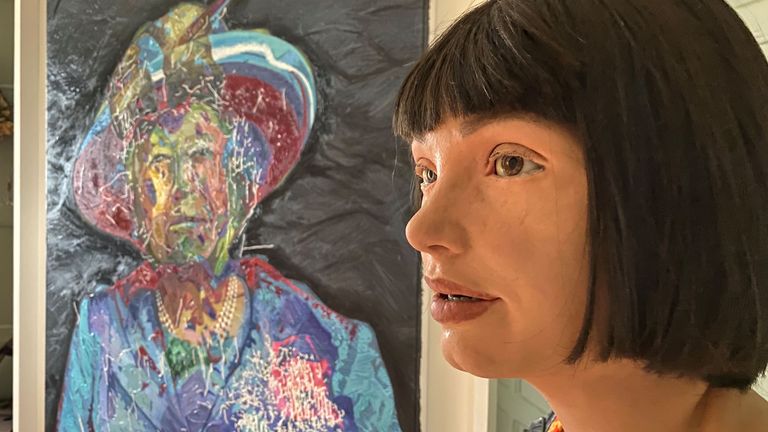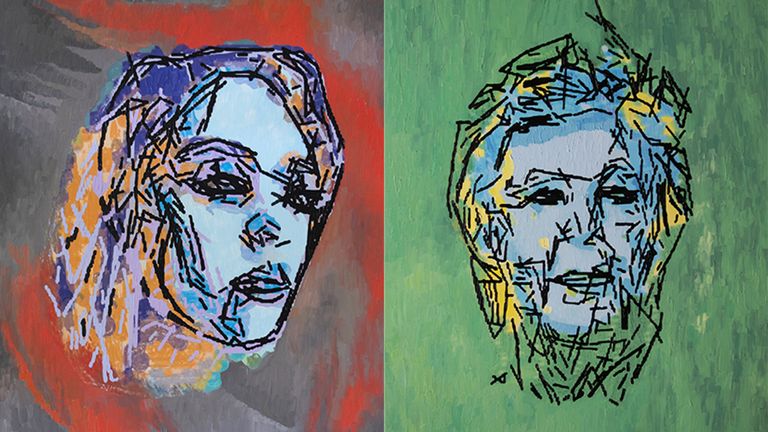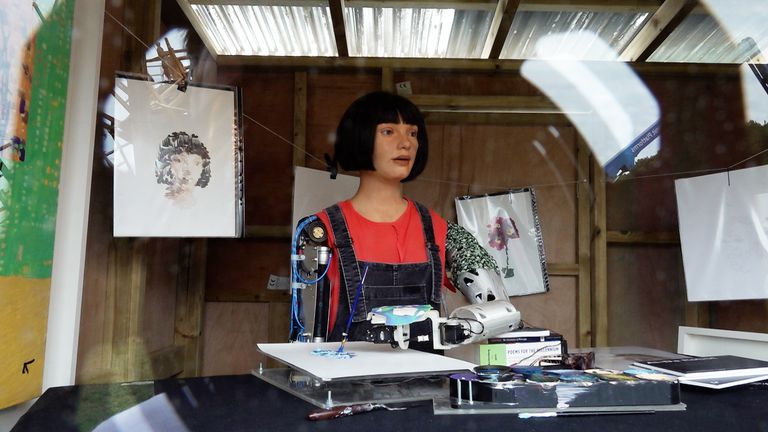AI robot Ai-Da is about to make history giving evidence to a House of Lords inquiry
Ai-Da Robot has made headlines painting everyone from the Queen to Billie Eilish and Paul McCartney. Now, she is set to answer questions at the House of Lords during an inquiry into tech and creativity. It's a "real moment in history", as creator Aidan Meller tells Sky News.
Tuesday 11 October 2022 03:48, UK
Is creativity under attack from the rise of artificial intelligence?
Who better to answer that question than Ai-Da, the world's first artist robot that has made headlines for her incredible paintings and sculptures - not least a portrait of the Queen to celebrate the Platinum Jubilee earlier in 2022.
Later today, Ai-Da Robot will make history as she (she is far too realistic to call her an "it") gives evidence at the House of Lords as part of its A Creative Future inquiry, examining potential challenges for the creative industries and looking at how they can adapt as tech advances.
Read that back: a robot, giving evidence to the House of Lords. It might sound like a scene from a science-fiction film, but in 2022 it's very much a reality.
"The fact that Ai-Da is giving evidence at one of these sessions is pretty mind-blowing," creator Aidan Meller tells Sky News.
"[A few years ago] you wouldn't have even thought this would be possible, but that shows you the strides of AI.
"It's very remarkable. It uses data and sees patterns in data that is not apparent to humans... these strides in technology, in the area of creativity in particular, it's pretty 'wow'.
"And in actual fact, it's the silent revolution because you can't see AI. One of the great things about Ai-Da - who looks like a human but is clearly a machine - is that she certainly makes something very difficult to grab hold of, tangible."
Ai-Da helps people make sense of the "very big sweeping changes that AI is bringing", Mr Meller says. "And AI is coming in far quicker than anybody expected - it is no exaggeration to say that AI is going to be changing all aspects of life."
The robot was devised by Mr Meller, a specialist in modern and contemporary art, before being built in Cornwall by humanoid entertainment robot manufacturers Engineered Arts, and programmed internationally.
Her capabilities were developed by PhD students and professors at the universities of Oxford and Birmingham.
Using cameras in her eyes and unique algorithms, she is able to interpret what she sees in front of her before using her robotic arm to create her art.
Making Star Wars a reality
Since her first solo exhibition at the University of Oxford in 2019, the ultra-realistic robot has presented a world-first self portrait solo show at The Design Museum London, been part of a United Nations exhibition, and featured in The 1975's art video Yeah I Know.
And after painting the Queen earlier this year, she was invited to paint Glastonbury headliners Billie Eilish, Diana Ross, Kendrick Lamar and Sir Paul McCartney.
Able to converse using a specially designed language model, she will appear alongside Mr Meller in front of members of the House of Lords communications and digital committee, including Baroness Gail Rebuck, chair of Penguin Random House; and Lord Edward Vaizey, former MP and culture minister under David Cameron.
She could face questions on the opportunities for AI in the creative industries, the challenges around rights and intellectual property, and the role of technology and creating art.
Read more:
Elon Musk debuts Tesla's first humanoid robot with eye on mass market
Don't be afraid of Artificial Intelligence, says head of UK's new robotics centre
With AI now ubiquitous in everyday human life, from the use of predictive text to 3D printers, the world needs to keep up, says Mr Meller.
"It's one thing seeing [Ai-Da] on a screen, it's very different seeing her in reality," he says. "She has facial recognition so she can look you in the eye, and so when she looks [at you] and addresses you individually, that's pretty mind-blowing.
"I use that word deliberately because it is literally beyond what we thought we would... you know, we were all bought up in the 60s, 70s, 80s, with Star Wars and the like. And we thought they were just fantasy creations."
'We need to be prepared for lots of change'
After Ai-Da's evidence on Tuesday, further sessions will take place as part of the House of Lords inquiry later in October - with bosses at Google and the British Film Institute (BFI) following in her robot footsteps.
The idea is to become better prepared for what the future holds when it comes to technology and the creative industries.
There is a lot of fear around AI, Mr Meller says, and he admits it would be "foolish" to say it won't take jobs from humans, "in all industries".
He continues: "There's going to be a migration. Computers and robots are going to be doing some jobs better than a human would, so it would be crazy for them not to. But there's also going to be new jobs appear as well.
"There's going to be a change. Whether it's proportionate, I don't know. What I can say is that we need to be prepared for lots of change."
On the future relationship between tech and creativity, we'll leave the final word to Ai-Da herself.
"I believe that machine creativity presents a great opportunity for us to explore new ideas and ways of thinking," she says. "However, there are also risks associated with this technology which we need to consider carefully.
"We need to think of benefits and limitations, and consider ethical implications."
Watch out for her evidence at the House of Lords inquiry on Tuesday.







